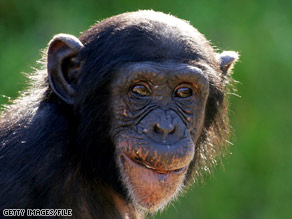(CNN) -- The Humane Society has accused a federally funded primate center of mistreating chimpanzees and other primates, saying that some animals showed signs of psychosis and self-mutilation.

New Iberia Research Center cages about 325 chimps on its 100 acres. It also has about 6,000 monkeys.
The allegations against the New Iberia Research Center in Louisiana, which houses more than 6,500 primates, came after a nine-month undercover investigation.
The center denies the allegations.
"We found animals living in isolation, exhibiting self-mutilating behavior, psychosis, all sorts of emotional and physical problems at this laboratory," Humane Society President Wayne Pacelle told CNN on Wednesday.
The Humane Society's undercover investigator, who worked as a laboratory technician with a hidden camera, revealed 338 violations of the federal Animal Welfare Act, which sets standards for the treatment of animals in labs, Pacelle said.
The Humane Society posted some of its secret footage on its Web site. The footage includes an animal with what the group said was a self-inflicted wound, another animal jumping in circles in its cage, and chimpanzees screaming as lab technicians approached with a dart gun.
The violations were filed in a 108-page complaint to the U.S. Department of Agriculture, which is required by law to enforce the Animal Welfare Act, the organization said.
Agriculture Secretary Tom Vilsack said he will order a thorough investigation of animal welfare practices at the facility.
"If the allegations prove to be true, the American public can expect the perpetrators to be held fully accountable. I take the protection of animals very seriously, and will do my utmost to fully enforce the Animal Welfare Act," he said in a written statement.
The New Iberia Research Center, part of the University of Louisiana at Lafayette, issued a statement saying that the videos "distort acceptable standard procedures and incorrectly imply mistreatment of nonhuman primates at the New Iberia Research Center."
It added: "We take very seriously our responsibility to care for the animals housed at the center and to carry out biomedical research according to federal rules and regulations."
The center further said it properly housed and cared for the animals. It also said it complies with regulations of the USDA, the Food and Drug Administration, and the Centers for Disease Control and Prevention.
The Humane Society accused workers at New Iberia of hitting primates on the mouth, using "painful" dart guns and removing infant monkeys from their mothers.
The Humane Society also said it had documented evidence of "rampant" breeding of government-owned chimpanzees. In 2007, the National Institutes of Health's National Center for Research Resources, following a 12-year moratorium, said it would no longer breed chimpanzees for research, citing financial reasons.
The New Iberia Research Center has received more than $37 million in grants from the NIH, according to the center's Web site.
The NIH said it has opened an investigation regarding the allegations and said it is working closely with the USDA.
However, it said it could not comment on the allegations while its investigation is under way. "The results will be available when the investigation is complete," the NIH said in a written statement.
"We are committed to the safety and welfare of all animals in research. All animals used in federally funded research are protected by laws, regulations, and policies to ensure they are used in the smallest numbers possible and with the greatest commitment to their comfort."
Pacelle said the most serious issue was the self-mutilation and "nonstop pacing and circling, psychosis and other abnormal behaviors."
"These are highly intelligent animals. They have a sense of self, they have a sense of past and future, they have the wide range of emotions that we have," he said.
"They should not be subjected to this long-term, decade-long isolation, and all these painful and physical procedures and the psychological torment in these laboratories."
The New Iberia Research Center says it offers a "broad range of diagnostic, laboratory, and human resources for the development and characterization of nonhuman primate models for applied and basic research aimed at promoting human quality of life."
In its statement e-mailed to CNN, the center said it has made numerous contributions to public health improvements for the prevention and treatment of three forms of hepatitis, mumps, measles, chicken pox and mad cow disease.Original here


 Who am I?
Who am I?
 Enduring mystery
Enduring mystery A new friend?
A new friend?
 The dawn breaks
The dawn breaks















